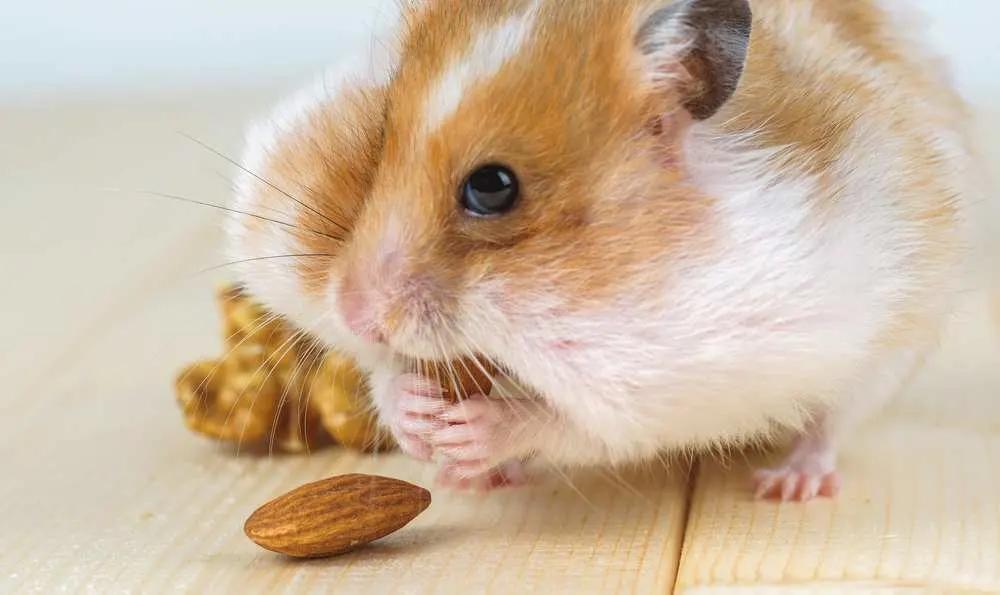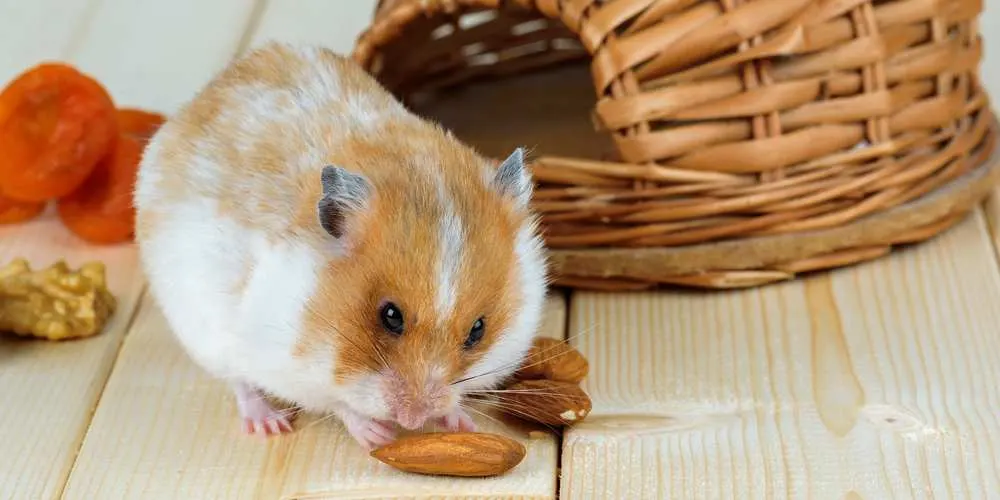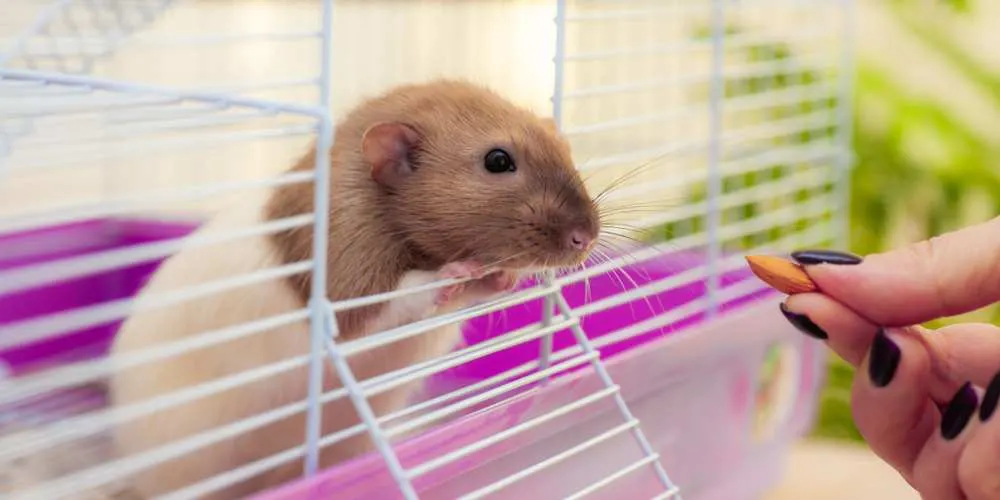Time is unforgiving sometimes. Constantly being in some kind of rush doesn’t fully allow us to dedicate ourselves to our hamsters’ diet. Regarding that, some of you have probably asked yourselves: “Can hamsters eat almonds?”, can it be dangerous?
To be honest with you, they most certainly can, but only if you carefully select the proper almonds.
You’ve probably heard that almonds possess exceptional nutritional values that are beneficial to humans. And now you are wondering if they can be implemented in hammies’ diet. Almonds are an excellent treat for your furball, but it has a particular component that can be highly harmful to hamsters.
What is that component? How badly can it affect the health of hamsters? Is there a way to bypass that component and still offer almonds to hammies?
The answers are hidden below, so don’t be shy – venture into the unknown, and in doing so, you will help your hamsters!

Are Almonds Dangerous To Hamsters?
To successfully understand how almonds can affect hamsters’ life, I will first dissect their regular diet. Wild hamsters need to keep a proper balance between eating plants and animals to survive. Any mistake will lead them to have some kind of stomach problem.
The same can’t be said for domesticated hammies as we, their owners, take care of their diet. Pay close attention and correctly calculate when and what they eat so that hamsters won’t have any problems. Concentrate at all times; they strictly depend only on us!
A brief list of food for pet hamsters should be composed of:
- Commercial hamster pellets
- Fresh hay
- A moderate amount of fresh vegetables and fruits
- Treats on rare occasions
That is precisely where almonds belong to in hammies’ diet – as treats. You might wonder why you shouldn’t give vast amounts of snacks at once to your pets. Every treat that exists should be handled with great care when considering the optimal quantity for intake.
Some snacks contain large amounts of sugar. Others are high in salt. But what if I told you that almonds don’t belong in either of those groups? The thing that separates almonds from nearly all other types of treats is – cyanide.
I understand you completely; just that word alone might make you nearly give up on even trying to give hammies some almonds. I must admit that I was scared when I discovered that fact, but I had a feeling that that mustn’t be the only truth. And I was right!
Not all types of almonds possess dangerous amounts of that irritating chemical inside them. I’ll dissect them in a matter not so complicated to follow up:
Raw Almonds
The most widely accessible variant of almonds that are available in most markets. Soft texture and great taste – it is a phenomenal snack. And most importantly, raw almonds have low cyanide levels inside them. I recommend giving some to your hamsters!
Salted Almonds
We have a habit of seasoning nearly every type of food that we eat. And why shouldn’t we – everything always tastes better with a pinch of salt over it, right? Salted almonds may be more appealing to us, but you should avoid giving some to your hammies.
The presence of salt in almonds increases the amount of sodium in them. Excess sodium increases blood pressure because it holds extra fluids, burdening the heart. For hamsters, too much sodium intake may increase the risk of kidney disease and heart failure.
Roasted Almonds
Every once in a while, it might be worthwhile to consider roasting some almonds. Shoving some in an oven for a short amount of time will do the trick! Throughout that process, the high temperatures will make the fat and calories slightly rise.
But the difference is insignificant, so don’t hesitate to give them some. My hamsters love to eat them from time to time!
Shelled Almonds
Did you know that almonds grow on trees? When the tree blossoms, it provides almonds with a shell that protects them until we pick them from the branches. Hamsters can eat shelled almonds, but it may give them some work to do before getting to the almond itself.
Almond Butter
If you want to spice up the diet of hamsters, you can offer them some almond butter. To make some, you just need to put raw almonds in an oven and roast them for several minutes. After that, let them rest until they cool down a bit. The last step is to blend them.
It may not look like your average almond butter, but your hamsters can only eat it like that. This is because standard almond butter requires some kind of oil mixed with it to give it a creamy texture, and hamsters don’t tolerate those oils.
If you opt to make some, then you should know that one-fourth of a teaspoon, once a month, can be given to your furball.
Bitter Almonds
Here comes the tricky part. Always remember; never give bitter almonds to hamsters. They have high doses of cyanide in them. So much so that if they consume even one piece, it will lead them to inevitable death. Stick only to the ones that I’ve mentioned before.
All the safe variants of almonds go to the same category when discussing the amount to give to hamsters. There won’t be any consequences in giving one almond every other day to your hammies.

Qualities That Almonds Possess
After all that trouble, if you are courageous enough to implement almonds in hamsters’ regular diet, I assure you that you won’t regret it. It is a phenomenal snack that every hammy adores eating. And how will they not? Almonds contain incredible nutrient values.
What makes almonds so healthy? Take a look:
| Calories | 579 |
| Sugar | 4.4 g |
| Fiber | 12.5 g |
| Fat | 49.9 g |
| Protein | 21.2 g |
| Water | 4.4 g |
| Vitamin E | 25.6 mg |
| Potassium | 705 mg |
| Phosphorus | 484 mg |
| Magnesium | 268 mg |
| Calcium | 264 mg |
To put this in a closer perspective, I’ll discuss the most vital attributes of almonds.
Maintaining Proper Levels of Blood Sugar
Diabetes is a common problem that hamsters develop. They are voracious by nature, meaning that they will eat nearly everything that is given to them. Some studies show that that kind of behavior happens in correlation to their need to hibernate.
Wild hamsters will hibernate if the weather is too cold for them to operate appropriately. The same habit rarely exists in domesticated hammies as they are provided with proper care and warm conditions to live in. Scientists believe that to be the case as to why they overeat.
An excessive amount of food may lead to diabetes, and to prevent that from happening, it’s recommended to give them almonds. They contain Vitamin E, which helps control blood sugar levels.
Controlling Weight Of Hamsters
Even if hamsters don’t possess diabetes, they are usually fat as pets. Having more weight than they should prove troublesome on some occasions. They are energetic animals that love to run all around the place. Excess weight will prevent them from playing too much, which can lead to depression.
Not only that, bones can’t correctly maintain posture when they carry more weight than they can. Implementing almonds in hamsters’ diet can help with that. Almonds have high protein levels, which can help them control weight, and protein builds them muscle, making them solid!
Preserving The Digestion System
The first and foremost home that we all possess is our body. Without eating correctly, our internal organs will be liable to some form of illness. The same refers to hamsters who are dependent on us as their food providers.
Maintaining a proper diet is essential to keep their general health safe. That is achievable by giving hamsters almonds on some occasions as they possess dietary fibers. Those same fibers maintain optimum food digestion and absorption without any problems.
Lowering Cholesterol
Preventing cholesterol-related diseases is essential as hammies are likely to acquire some throughout their lives. Feeding them with almonds will prevent that, as almonds negate the spike in cholesterol levels in hamsters.

Can Hamsters Eat Almonds? – To Summarize
If you are still unsure can hamsters eat almonds, there is no need to worry, as it represents a perfect snack for them. The presence of cyanide may be terrifying, but I assure you that it is perfectly safe to consume them in moderate amounts.
Highly nutritious by nature, it indeed will prove beneficial regarding the general health of hamsters. Be it Vitamin E for regulating blood sugar, high protein levels for weight loss, or dietary fiber for maintaining optimal body weight – almonds will undoubtedly help hamsters out.
Be sure always to avoid bitter almonds as they are the ones that have high levels of cyanide in them. Any form of raw, roasted, and even shelled almonds come in nicely, but only once every two days!
Many misconceptions exist in the realm of hamster owners when discussing almonds. Let’s alter that by educating ourselves with pieces of information that will tighten our relationship with hammies!

